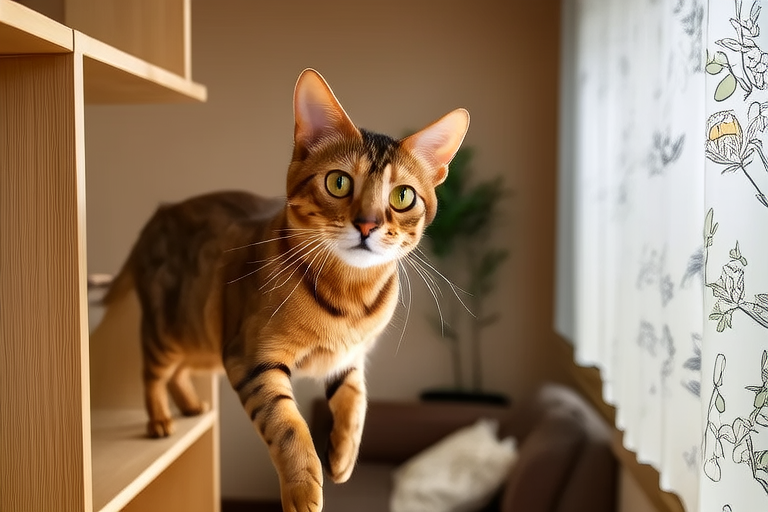Top 10 Reasons Your Home Needs an Abyssinian Pet
Welcome to a world where your home could be transformed by the presence of a charming, intelligent, and affectionate companion – the Abyssinian cat. Known for their striking appearance and unique traits, these cats have been adored by many for centuries. In this article, we will explore why an Abyssinian might be the perfect addition to your family, detailing their history, characteristics, interaction with humans and other animals, grooming needs, health considerations, dietary requirements, and tips for successful adoption.
A Brief Historical Background
The Abyssinian is believed to have originated in ancient Egypt, where they were revered and often depicted in hieroglyphics. These cats have a rich history that spans thousands of years, with evidence suggesting they were brought to England in the 19th century. The modern Abyssinian breed was developed in the UK, and it has since spread across the globe, captivating hearts everywhere.
1. Playful and Affectionate Nature
Abyssinians are known for their high energy levels and love of play. They are incredibly active, always ready for a game of fetch or a chase around the house. Their playful demeanor makes them excellent companions for families with children who enjoy interactive activities. However, they also know when it’s time to cuddle up and show affection, making them ideal lap cats for those seeking comfort and companionship.
2. Intelligence and Problem-Solving Skills
One of the most notable traits of Abyssinians is their intelligence. These cats are quick learners and can solve puzzles or figure out ways to open doors or cabinets. Their curiosity often leads them to investigate every corner of their environment, making them fascinating to watch. This intelligence also means they can learn tricks and respond well to positive reinforcement training methods.
3. Adaptability
Abyssinians are highly adaptable creatures, capable of adjusting to various living conditions. Whether you live in a small apartment or a spacious house, they can thrive as long as they have enough space to play and explore. They are also adaptable to different routines and schedules, making them suitable for busy households.
4. Low Shedding
Unlike some other breeds, Abyssinians shed less fur, which is great news for allergy sufferers and those who prefer a cleaner living environment. Their short, fine coat requires minimal grooming, usually just a weekly brushing to remove any loose hairs and distribute skin oils.
5. Interaction with Families and Children
Abyssinians are social cats that enjoy the company of their human families. They get along well with children, providing endless entertainment through their playful antics. They are gentle and patient, teaching kids about responsibility and empathy. Additionally, Abyssinians tend to bond strongly with all members of the household, becoming loyal and loving pets.
6. Compatibility with Other Pets
Abyssinians generally coexist peacefully with other pets, including dogs and other cats. Their friendly nature allows them to integrate smoothly into multi-pet homes. However, it’s important to introduce them gradually and under supervision to ensure a harmonious relationship.
7. Grooming Needs
Despite their low-shedding coats, Abyssinians still require regular grooming. A weekly brushing helps keep their coat healthy and shiny while preventing matting. Bathing is rarely necessary unless the cat gets particularly dirty. Nail trimming, dental care, and ear cleaning should also be part of their routine maintenance.
8. Health Considerations
Abyssinians are relatively healthy cats but may be prone to certain genetic disorders, such as Periodontal Disease, Renal Amyloidosis, and Progressive Retinal Atrophy. Regular veterinary check-ups and preventive care can help manage these conditions effectively. Early detection and treatment are crucial for maintaining their overall health.
9. Dietary Requirements
A balanced diet is essential for the health and longevity of your Abyssinian. High-quality commercial cat food formulated for their specific age, size, and activity level should form the basis of their diet. Fresh water should always be available. Some Abyssinians may benefit from supplements like fish oil for joint health or probiotics for digestive support. Always consult with your veterinarian before introducing any new foods or supplements.
10. Tips for Successful Adoption
Adopting an Abyssinian from a reputable breeder or rescue organization ensures that you bring home a healthy, well-socialized kitten. Reputable sources conduct thorough health screenings and provide documentation of vaccinations and deworming. When bringing your new cat home, create a quiet, safe space for them to adjust. Gradually introduce them to other household members and pets to minimize stress. Patience and consistency are key during this transitional period.
Conclusion
In conclusion, the Abyssinian is more than just a pretty face; they are loving, intelligent, and adaptable companions that can enrich the lives of their human families. With proper care, attention, and a nurturing environment, these cats can become cherished members of any household. By understanding their unique traits and needs, you can ensure a happy and fulfilling life for both you and your Abyssinian. So, if you’re looking for a special addition to your home, consider welcoming an Abyssinian into your life. You won’t regret it!
